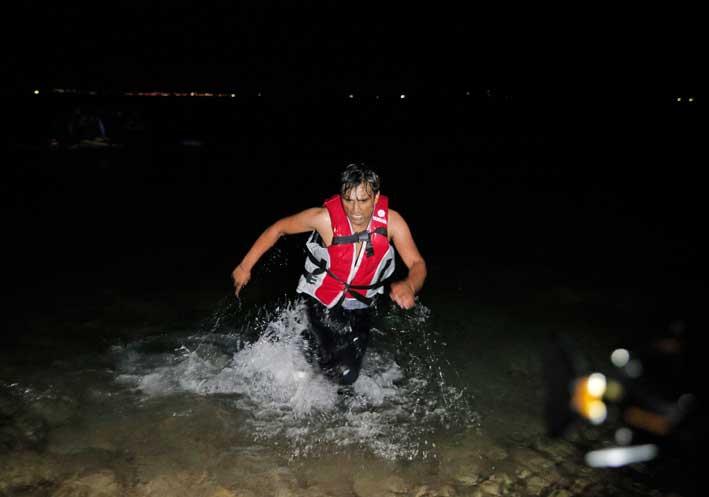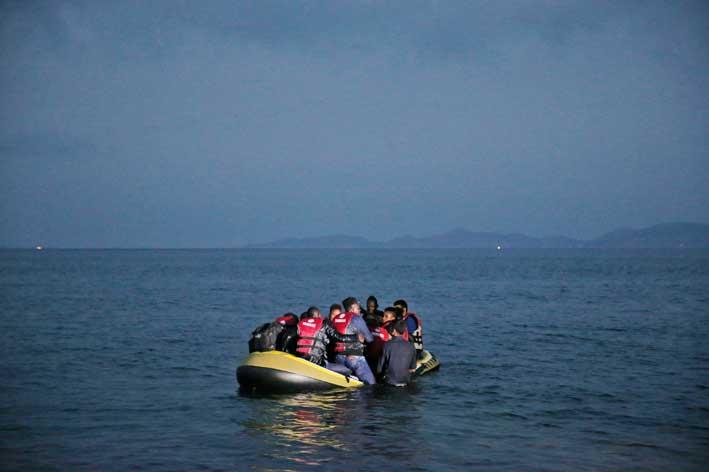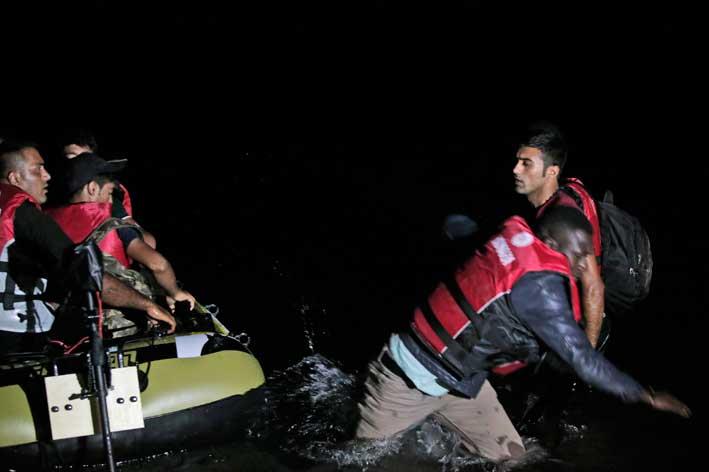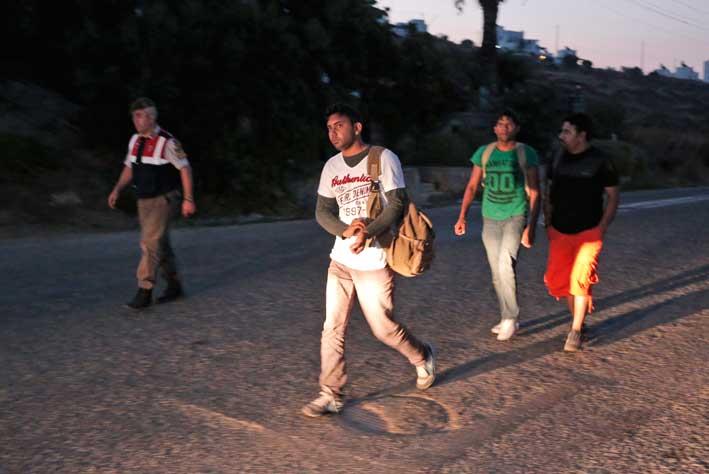Suddenly, almost silently, a group of young men carrying a small plastic dinghy emerges from the darkness, dashes across a road and a dirty strip of sand and plunges into the crystal-clear waters of the Aegean Sea.
With the lights of the Greek island of Kos twinkling through the darkness — beacons of hope for a new and better life — another group of migrants has set off to make a risky — but less risky than most — sea crossing and apply for asylum in Europe.
The city of Bodrum, a magnet for wealthy tourists from Turkey and around the world, is these days drawing plenty of other visitors— migrants fleeing conflicts in the Middle East and Africa and seeking a better life in Europe, a continent so close they can almost reach out and touch it from the Bodrum peninsula's many beaches. At its closest point, Kos is only 4 kilometers (2.5 miles) from Turkey.

Migrants, mostly from Syria, but also from Afghanistan, Iran and African nations often try to cross from the secluded beaches of Bodrum peninsula in groups upward of eight people in inflatable plastic boats meant for a maximum of four, powered by tiny electric outboard motors and plastic paddles.
Mohammad Ali, a 36-year-old Syrian law graduate who was a merchant in the town of Idlib before fleeing, is waiting in the park with his wife, two young sons and other family members for a second attempt to flee to Europe.
They abandoned their first crossing after a smuggler who promised a boat with eight people on board instead tried to cram in 16.
"It was about to sink. I was afraid of drowning so I decided to turn back," he said.
While tourists eat and drink at Bodrum's upscale waterfront restaurants, migrants carrying their meager belongings in backpacks sit across the street under palm and eucalyptus trees close to huge yachts moored in Bodrum's harbor. There they wait to be taken to a remote beach before they are packed into tiny dinghies for the short crossing across a waterway also plied by giant oil tankers, tourist pleasure cruisers and coast guards.

Kenan Karsanbar, sitting on the shaded deck of a yacht moored in Bodrum's harbor, looked out over small knots of migrants who were also trying to escape the searing heat of the midday sun in the shadows of eucalyptus trees. He said he feared for their safety making the crossing.
"I'm sure many of them have never even seen the sea," he said. "It is dangerous even for four people (in such a small boat) — for 15 people, it is 100 percent dangerous."
A children's playground a couple of blocks away from busy tourist shopping streets has become a makeshift staging post for migrants waiting to be smuggled. There, in temperatures hovering around 35 degrees Celsius (95F), they lie on dirty matrasses, rugs or flattened cardboard boxes spread out on a baking hot ground littered with cigarette butts and the husks of sunflower seeds.
Nearby, a small store that sells tourist trinkets and cigarettes now has a new line of products — red and orange life preservers bought by migrants — those who can afford them — to wear on their crossings.
"This is the new reality," says a store worker who refused to give his name.
Many of the migrants seen setting off for Greece by an Associated Press team watching dead-of-night departures used a type of boat that can be ordered online for around 100 euros. The small electric motors cost more, but with smugglers charging around $1,200 per passenger — according to migrants — it is a lucrative illicit trade.

Smugglers seen organizing the departures from Fenerburnu beach refused to speak to reporters about their trade.
A Turkish government official said that the human smugglers have turned to the Aegean in the past year using inflatable boats he called Zodiacs, after patrols increased on popular migrant routes across the Mediterranean.
"The Aegean is a lot easier. All they need is a Zodiac boat and they are on an island in half an hour," the official said on condition of anonymity in line with government rules that bar civil servants from speaking to journalists without prior authorization.
That quick crossing is easier and safer than longer crossings organized from North African nations like Libya to Italy.
Underscoring the risks, at least 40 migrants died Saturday in the hold of an overcrowded smuggling boat in the Mediterranean Sea north of Libya, apparently killed by fuel fumes. Some 320 others aboard were saved by the Italian navy, the rescue ship's commander said.

The deaths are not deterring migrants, many of whom have likely seen plenty of fatalities in conflicts in nations like Syria and Afghanistan.
The number of people trying to reach Europe by sea is on track to hit a record this year, according to the Geneva-based International Organization for Migration.
Financially struggling Greece has reported 134,988 arrivals from Turkey this year, it said, while Italy recorded 93,540 newcomers through July. Along with migrants landing in Spain and Malta, 237,000 people have made the crossing so far this year, the agency says, compared to 219,000 for all of 2014.
It also estimated at least 2,300 people have died this year trying to cross to Europe. It is unclear how many people may have died between Bodrum and Kos.
On three nights of watching migrants set off from Fenerburnu beach, an Associated Press team saw overcrowded dinghies begin to take on water and sink, but they were close enough to the shore for migrants to leap out and wade to safety.
In the early hours of Sunday, one woman abandoned a dinghy and ran to the shore, where she cried out to others on board: "Guys, you are risking your life. This boat is filled by water please come back!"
The migrants don't have time to talk as they sprint into the water and start paddling. They sometimes appear well-drilled, with a clear choice of a person to sit at the back steering using the outboard motor.
But other times it is poorly organized chaos. On a recent night, migrants scuffled and pulled one man out of a boat, while another almost sank before many of those on board jumped out and ran to the shore.
Then they have tides, currents and Turkish coast guard patrols to contend with before they reach Kos, where they often wade ashore among tourists lying in the sun.
In the past year, Turkey has increased patrols in the Aegean by 50 percent, according to the government. Migrants who are caught sleeping on the streets, or who are suspected of waiting for boats to take them to the islands are taken to refugee camps, officials say.
But the measures appear to be doing little to turn back the human tide.
Around 7,000 migrants, mainly Syrians, reached Kos last month, twice as many as in June.
The governor's office in Izmir, another tourist city on the Aegean, said last week that 2,791 migrants were caught in the Aegean in the prior five days. So far this year, 33,180 migrants have been caught or rescued.
Syrian migrant Ali said he would try a second time, but this time without life vests, which he said were confiscated by Turkish police after his failed attempt last week.
"My ultimate goal is my family," he said. "I don't have anything left in my country to return to. War has spared nothing."